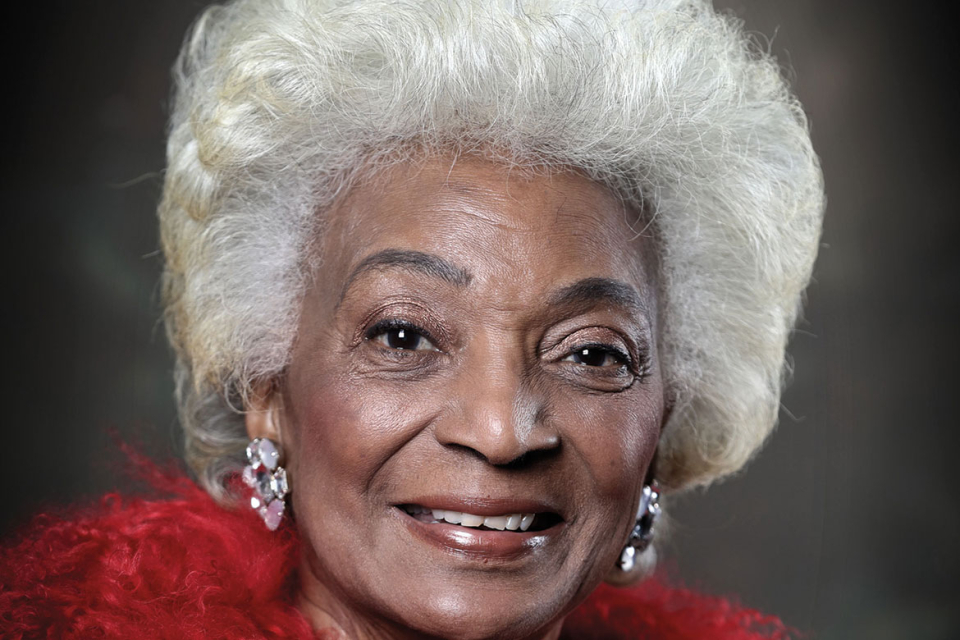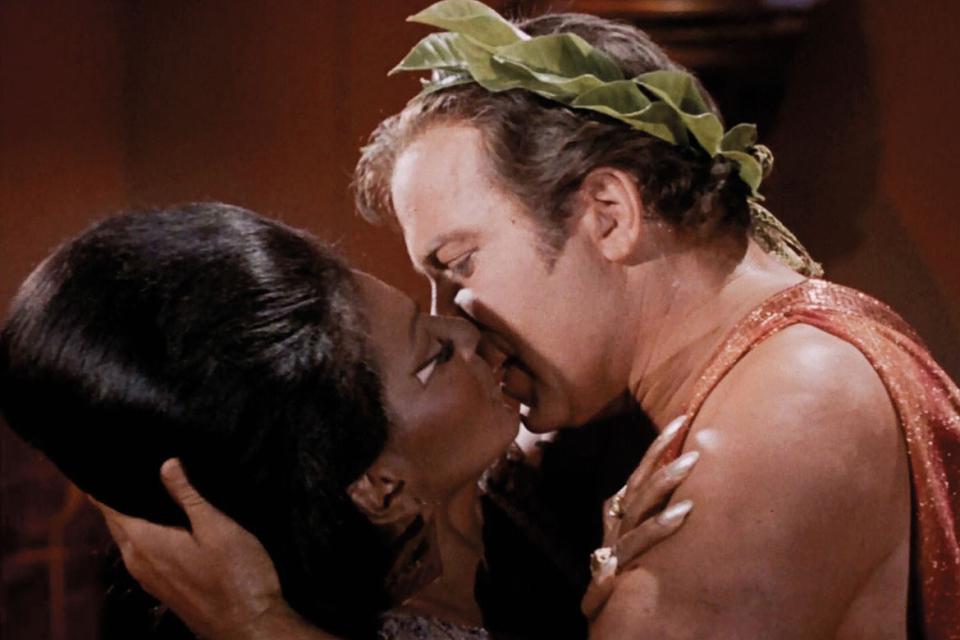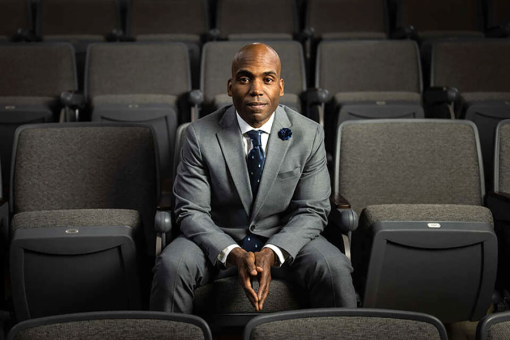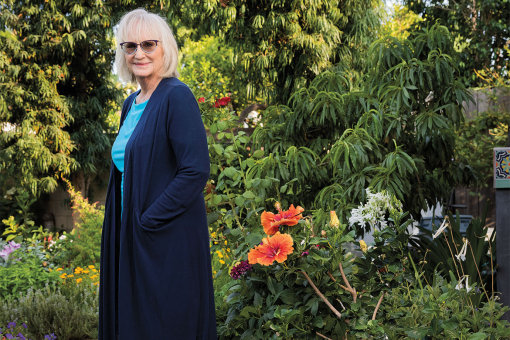If not for a surprise meeting with Dr. Martin Luther King Jr. in 1967, Nichelle Nichols might have had a much shorter tenure on the groundbreaking original run of Star Trek. Though Nichols envisioned herself having a career on Broadway and intended to leave Star Trek for a role there, King's encouragement helped her realize that the dignified character of starship bridge officer Nyota Uhura was an important role model. He convinced her to return to the series, where she remained until its cancellation in 1969, becoming a cultural icon in the process.
Nichols was born in Illinois and started out in musical theater; she toured as a singer and dancer with the Duke Ellington band before being cast in Star Trek. She was featured on the cover of Ebony magazine in 1967. Her role of Lieutenant Uhura was hailed for defying stereotypes of Black women onscreen, and the interracial kiss that she shared with costar William Shatner (as Captain Kirk) was unheard of at that time. A fan favorite, she went on to costar in six Star Trek films and made frequent appearances at fan conventions well into her eighties.
Nichols was also a pioneer in the recruitment of women and minorities for America's space program. In 2021, she was awarded the NASA Exceptional Public Achievement Medal for her decades of service dedicated to increasing diversity at the agency.
In 1994, Nichols published her autobiography titled Beyond Uhura: Star Trek and Other Memories. She was nominated for a daytime Emmy (for outstanding special guest performer in a drama series) in 2017 for her role in The Young and the Restless.
She died in New Mexico in 2022 at age 89, survived by her son, Kyle Johnson. She was interviewed in October 2010 by Stephen J. Abramson for The Interviews: An Oral History of Television, a program of the Television Academy Foundation. The following is an edited excerpt of their conversation. The entire interview can be screened at TelevisionAcademy.com/Interviews.
Q: What was your name at birth?
A: Grace — everybody called me Gracie, which I hated. So when I was thirteen or fourteen, I went to my mother and said, "Rename me."
She said, "I wanted to name you Michelle. And maybe you should have the same initials [in your first and last name] like Marilyn Monroe."
I laughed and joked, "I like Michelle; why don't you name me Nichelle?" And she said, "I like Nichelle; that's your name."
Q: When you were growing up, what were you interested in?
A: Ballet consumed me until I discovered other forms of dance. I grew up in musical theater. I had my first professional job when I was fourteen years old, in Chicago at The Sherman House.
Q: Your first television appearance was on the 1964 series The Lieutenant, which was produced by Gene Roddenberry. When did you meet him?
A: I was doing a night scene and there was this creepy guy in an overcoat who kept coming up behind me. I turned and said, "I'm working, please."
I tried to be polite, but I complained to the AD and he said, "Don't pay any attention to him; he drives everybody crazy. He's related to the producer."
I said, "To Gene Roddenberry? Where is he? I've never met him."
And he said, "He never comes on the set unless there's a problem."
I said, "Well, we're having a problem right now, because his cousin or whoever is driving me nuts." And he said, "We'll see what we can do."
Then Gene came over to me — the crazy relative was Gene Roddenberry. He used to play jokes on people. He had this weird sense of humor. We became good friends.
Q: Did Roddenberry talk to you about the new series he had in mind?
A: I remember him talking about working on something that had people of all races involved. He said, "It's time for people to cast without it being a Black person's role or an Asian person's role. People are people and we do it every day in our society; why isn't it reflected on television? I'm going to do it."
Time went by and I was in Europe and got this call from my agents, "Come home, you're doing Star Trek." I came back and read for the part.
Gene told me later that he tried and tried to sell his script, and because he was one of the most sought-after writers in episodic television, every studio said they wanted to see him, until they found out what the script was. "This is a great script, Gene, but one of the main characters is a Black woman. We'll have to change this character." And he said, "No, none of the characters can be changed."
This went on, studio after studio — they wanted the Black and the Asian in subservient roles. Finally, a guy said to him, "Gene, you're moving too fast. The public won't accept this. Maybe in three hundred years America will be ready." Gene went home and wrote it in the 23rd century, and in what better location than on a spaceship? He named it Wagon Train to the Stars. They renamed it Star Trek.
Q: When you auditioned was your character Lt. Uhura?
A: The name did not exist. They gave me three pages to look over when I came in. I had a big book with me that I had been reading — one of the best written treatises on Africa. It was called Uhuru, which is Swahili for freedom.
When I went for my first costume fitting, Gene asked to see me. He said, "You're going to replace the communications officer." [Actor Lloyd Hanes did not return to the role.] I said, "Okay."
And he said, "I really like the book you brought in. I started reading it and am interested in the name Uhuru as your name. But it sounds too harsh for a female."
I said, "Why don't you soften the end with an 'A,' Uhura?"
He looked at me and said, "That's it, that's your name. And I now know exactly where your character comes from — the United States of Africa."
I said, "There is no...."
He said, "There will be in three hundred years."
What a brilliant man this was. He put me on the screen, and though some people said, "She's got to go," Gene wouldn't have it.
Q: Uhura was on the command crew of the bridge, an officer. Did you feel this was a groundbreaking character?
A: I didn't know that then. I still thought I was going to star on Broadway. Star Trek interrupted my career — that's the way I looked at it. By the end of the first season, I was offered a play that was Broadway bound. I told Gene that when the season was up, I was going to leave, and he said, "You can't. You don't understand what I'm trying to achieve here."
I said, "Gene you've been wonderful, and I really thank you for this opportunity, but my life is musical theater." I handed him my resignation that I'd written out, and he took it and said, "Take the weekend, Nichelle, and think about it. If you still feel the same way at the beginning of next week, go with my blessings."
As fate would have it, I was scheduled to be a celebrity guest at some fundraiser in Beverly Hills that Saturday. I believe it was an NAACP fundraiser. I had just sat down when the organizer came over and said, "Ms. Nichols, there's someone here who said he is your biggest fan, and he really wants to meet you." I said, "Certainly."
I stand up and I'm looking for a young man who's a Star Trek fan, and standing there is this face the world knows, with his beautiful smile on it. I remember thinking, that fan is going to have to wait because Dr. Martin Luther King, my leader, is walking toward me.
And then he says, "Yes, Ms. Nichols, I am that fan. My family are your greatest fans. As a matter of fact, this is the only show on television that my wife Coretta and I will allow our children to stay up and watch, because it's on past their bedtime." And my mouth just opened and closed. He said, "We admire you greatly. The manner in which you've created this role has dignity."
I said, "Dr. King, thank you so much. I really am going to miss my costars."
And he said, "What do you mean?"
I said, "I've had an offer. I'm going to leave Star Trek..."
He said, "You cannot. You cannot."
I was taken aback, and I just looked at him. He said, "Don't you understand what this man [Roddenberry] has achieved?" I had déjà vu all over again. He said, "For the first time on television, we will be seen as we should be seen every day, as intelligent, quality, beautiful people who can sing, dance, who can go into space, who can be lawyers, who can be teachers, who can be professors, and yet you don't see it on television until now."
I just stood there realizing every word that he was saying was the truth. He said, "Gene Roddenberry has opened a door for the world to see us. If you leave, that door can be closed." And at that moment, the world tilted for me.
Come Monday morning I went to Gene. I told him what happened, and I said, "If you still want me to stay, I'll stay." He looked up at me and said, "God bless Dr. Martin Luther King." He took out my resignation and tore it into a hundred pieces. And my life's never been the same. I never regretted it, because I understood the universe had somehow put me there.
Q: So you came back to Star Trek. Then near the end of the second season, April 1968, Dr. King was shot and killed. What was your reaction when you heard that news?
A: I'll never forget it. I felt like I was adrift on this ship out in the ocean and there was nothing I could do. I couldn't cry. I just felt like a lump of protoplasm that had no rhyme or reason. I felt so useless. It's the same as when the space shuttle went down. I had that same sense of futility.
Q: Are you talking about Challenger?
A: Yes, two of them [who died] were my recruits.
Q: You were very involved with NASA by that point, right?
A: I accepted a contract from NASA to recruit the first women and minority astronauts for the space shuttle program, because they were not getting the kind of response from women and people of color that they expected. I said, "I will accept it, but I have to do it on my terms, I cannot have a NASA representative taking me around and propping me up with a prepared speech. I'll do it under my company, Women in Motion."
Q: Returning to Star Trek, what kind of reactions did you get from people who recognized you as Uhura?
A: I have had people of every color, men and women, girls and boys, come up to me and say, "Until I saw you on television as Uhura, I saw the world totally differently. You changed my life."
In England one time, skinheads had said something about planning to disrupt a Star Trek event because they didn't believe in the mingling of the races. There was an autograph line hundreds of people long, and about ten people back was a man with his head shaved. He said, "I have to talk to her."
They wouldn't let him, and I said, "Let him come talk to me."
He told me, "Until I saw you on television, I saw anyone outside of a white person as beneath me. Because of you and this show, I can never do that again. I just wanted to thank you." And it was one of the most moving things. In one way or another, I have heard that over the years.
Q: A historic episode of the show was called "Plato's Stepchildren." This was the kiss between Kirk and Uhura?
A: Yes. They saved it until the last day, at the end of the day. Bill takes me in his arms and he kisses me. "Cut!"
Bill said, "What?" The director, who I knew and had a great deal of respect for, said, "Bill, um..." and he walks over like I'm not sitting there, and starts talking to him. "Uh, you kissed her?"
And Bill says, "Yes, I kissed her. That's what the script says, 'he takes her in his arms and he kisses her.'" This went on and on, and I said, "Excuse me, I'll be in my dressing room. When you guys figure out what you want to do, let me know."
I'm called back about half an hour later, and Gene's there. The director's saying, "But the South. They'll black us out in the South." And now there are two guys in dark glasses and million-dollar suits.
Q: Studio guys, executives?
A: Studio guys. We were told to shoot the scene with and without the kiss. Bill said, "Let's do the kiss first and then we'll do one without it." So, we do the kiss. "That's fine, let's do it without." Bill said, "Let's do this one more time. I think that she should be resisting more." [Kirk and Uhura were forced to kiss via psychokinetic aliens manipulating them.] We do a take and I resist. And Bill says, "That's too much." We do six more kisses, and the AD is saying, "We have six minutes."
So this time instead of kissing me, Bill comes up near me and looks into the camera, and crosses his eyes. He hasn't kissed me, and the director isn't seeing what the cameraman is seeing, and the director says, "Ok, that's it. That's a wrap, thank you very much." I don't know what Bill has done, only the cameraman and whoever was behind the camera do, but I see them all smiling, and I just think they're happy to get home.
The next day, we're all invited to dailies. The last take comes up and you see Bill cross his eyes. Gene goes, "Well, that was interesting." The director just shook his head in disbelief, Bill sits there with a straight face, and I was determined that I wasn't going to crack until he cracked.
Finally, the suits stand up and there's this hush — are they going to throw the whole scene out? And the suits say, "Go with the kiss. Fuck them if they can't take a joke." And they walked out, and pandemonium broke loose. Laughter, all but the director.
Q: What's the legacy of Star Trek?
A: You are more than you think you are. Open up your mind and let the sunshine in. You're not better than anyone else, and no one is better than you.
Since 1997, the Television Academy Foundation has conducted over 900 one-of-a-kind, long-form interviews with industry pioneers and change-makers across multiple professions. The Foundation invites you to make a gift to the Interviews Preservation Fund to help preserve this invaluable resource for generations to come. To learn more, please contact Amani Roland, chief advancement officer, at roland@televisionacademy.com or (818)754-2829.
To see the entire interview, go to: TelevisionAcademy.com/Interviews.
This article originally appeared in emmy magazine issue #1, 2023.













